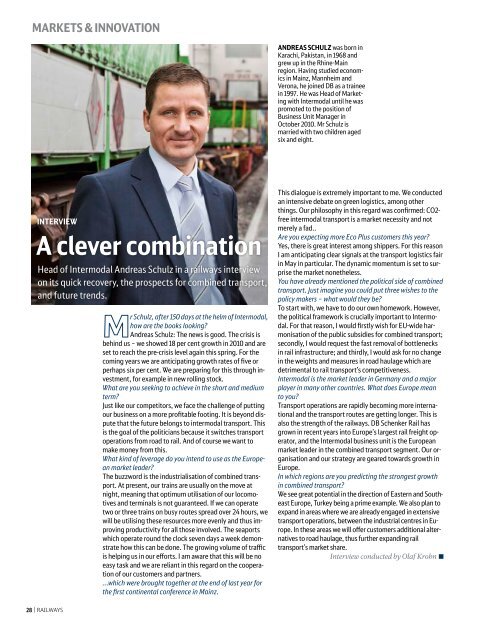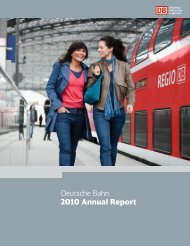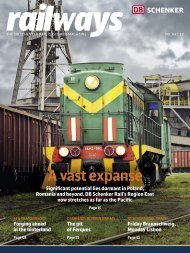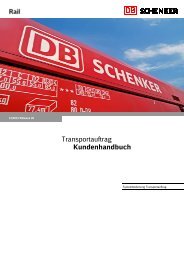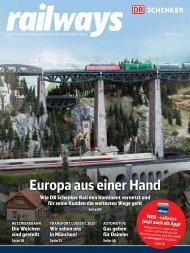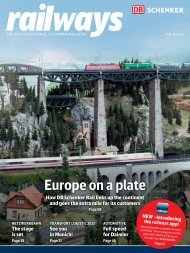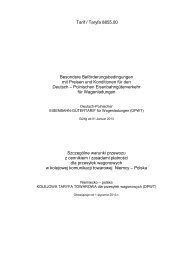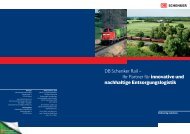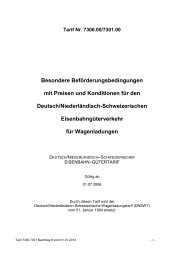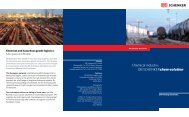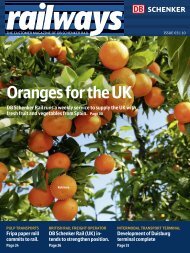PDF Download - DB Schenker Rail Deutschland AG
PDF Download - DB Schenker Rail Deutschland AG
PDF Download - DB Schenker Rail Deutschland AG
You also want an ePaper? Increase the reach of your titles
YUMPU automatically turns print PDFs into web optimized ePapers that Google loves.
MARKETS & INNOVATION<br />
INTERVIEw<br />
A clever combination<br />
Head of Intermodal Andreas Schulz in a railways interview<br />
on its quick recovery, the prospects for combined transport,<br />
and future trends.<br />
28 | <strong>Rail</strong>ways<br />
r Schulz, after 150 days at the helm of Intermodal,<br />
how are the books looking?<br />
Andreas Schulz: The news is good. The crisis is<br />
behind us – we showed 18 per cent growth in 2010 and are<br />
set to reach the pre-crisis level again this spring. For the<br />
coming years we are anticipating growth rates of five or<br />
perhaps six per cent. We are preparing for this through investment,<br />
for example in new rolling stock.<br />
What are you seeking to achieve in the short and medium<br />
term?<br />
Just like our competitors, we face the challenge of putting<br />
our business on a more profitable footing. It is beyond dispute<br />
that the future belongs to intermodal transport. This<br />
is the goal of the politicians because it switches transport<br />
operations from road to rail. And of course we want to<br />
make money from this.<br />
What kind of leverage do you intend to use as the European<br />
market leader?<br />
The buzzword is the industrialisation of combined transport.<br />
At present, our trains are usually on the move at<br />
night, meaning that optimum utilisation of our locomotives<br />
and terminals is not guaranteed. If we can operate<br />
two or three trains on busy routes spread over 24 hours, we<br />
will be utilising these resources more evenly and thus improving<br />
productivity for all those involved. The seaports<br />
which operate round the clock seven days a week demonstrate<br />
how this can be done. The growing volume of traffic<br />
is helping us in our efforts. I am aware that this will be no<br />
easy task and we are reliant in this regard on the cooperation<br />
of our customers and partners.<br />
…which were brought together at the end of last year for<br />
the first continental conference in Mainz.<br />
ANDREAS ScHULz was born in<br />
Karachi, Pakistan, in 1968 and<br />
grew up in the Rhine-Main<br />
region. Having studied economics<br />
in Mainz, Mannheim and<br />
Verona, he joined <strong>DB</strong> as a trainee<br />
in 1997. He was Head of Marketing<br />
with Intermodal until he was<br />
promoted to the position of<br />
Business Unit Manager in<br />
October 2010. Mr Schulz is<br />
married with two children aged<br />
six and eight.<br />
This dialogue is extremely important to me. We conducted<br />
an intensive debate on green logistics, among other<br />
things. Our philosophy in this regard was confirmed: CO2free<br />
intermodal transport is a market necessity and not<br />
merely a fad..<br />
Are you expecting more Eco Plus customers this year?<br />
Yes, there is great interest among shippers. For this reason<br />
I am anticipating clear signals at the transport logistics fair<br />
in May in particular. The dynamic momentum is set to surprise<br />
the market nonetheless.<br />
You have already mentioned the political side of combined<br />
transport. Just imagine you could put three wishes to the<br />
policy makers – what would they be?<br />
To start with, we have to do our own homework. However,<br />
the political framework is crucially important to Intermodal.<br />
For that reason, I would firstly wish for EU-wide harmonisation<br />
of the public subsidies for combined transport;<br />
secondly, I would request the fast removal of bottlenecks<br />
in rail infrastructure; and thirdly, I would ask for no change<br />
in the weights and measures in road haulage which are<br />
detrimental to rail transport’s competitiveness.<br />
Intermodal is the market leader in Germany and a major<br />
player in many other countries. What does Europe mean<br />
to you?<br />
Transport operations are rapidly becoming more international<br />
and the transport routes are getting longer. This is<br />
also the strength of the railways. <strong>DB</strong> <strong>Schenker</strong> <strong>Rail</strong> has<br />
grown in recent years into Europe’s largest rail freight operator,<br />
and the Intermodal business unit is the European<br />
market leader in the combined transport segment. Our organisation<br />
and our strategy are geared towards growth in<br />
Europe.<br />
In which regions are you predicting the strongest growth<br />
in combined transport?<br />
We see great potential in the direction of Eastern and Southeast<br />
Europe, Turkey being a prime example. We also plan to<br />
expand in areas where we are already engaged in extensive<br />
transport operations, between the industrial centres in Europe.<br />
In these areas we will offer customers additional alternatives<br />
to road haulage, thus further expanding rail<br />
transport’s market share.<br />
Interview conducted by Olaf Krohn


